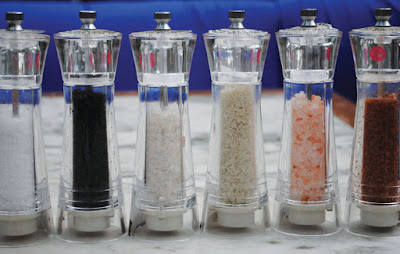SALT : different types & effects on health
Rock and sea salts seem to be all the rage –
especially with TV chefs. Consumers are easily mislead by the claims that these
salts are ‘natural’, better tasting and containing ‘essential minerals’ - making them better for us than table
salt.
A consumer survey in 2011 revealed that about
61% of people asked felt that sea salt was much lower in Sodium than table
salt.
Do not be deceived! Salt is salt. No matter how expensive salt is, whether
it comes in crystals or grains, from the sea or from the Himalayas, a survey showed found they all contain an equally high sodium content as table and cooking salt.
All salts therefore are equally damaging to our health when eaten in excess, don’t be fooled by some of the claims made by salt manufacturers.
Garlic salt and celery
salt are also popular alternatives to standard table salt. These products are
made predominantly of table, rock or sea salt combined with small amounts of
dried garlic or celery. The salt component is still sodium chloride so these too
should be limited as with rock and sea salt.
Did you know: Salt is used
to remove red wine stains
- See more at:http://www.foodnavigator-usa.com/Markets/Shoppers-mistakenly-believe-sea-salt-contains-less-sodium

No comments:
Post a Comment